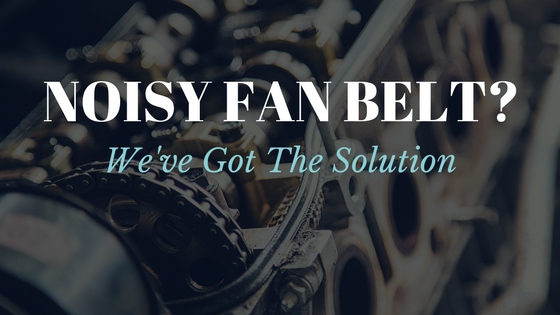Do you ever hear a loud screeching noise when you start your car? Do you find that it seems to be getting worse and lasting longer as time goes on? A squeaky fan belt in your vehicle’s engine can be annoying and embarrassing. It may happen for a number of reasons, and it’s not something you want to ignore. Fortunately, there are a few options when it comes to attempting to quiet it down.
What Does the Fan Belt Actually Do?
In order to explain why you may suddenly be hearing your fan belt, we must first explain what it actually does.
First of all, different vehicles have different belt systems. It may have one longer serpentine belt or multiple smaller accessory belts. The belt or belts have the important role of transferring the rotational energy created by the engine to its vital accessories. In this way, the belt keeps your fan, air conditioning, power steering pump, water pump and alternator working. It also indirectly keeps your battery from dying as that is a role of the alternator.
If your fan belt breaks or falls off, these components will eventually fail, potentially leading to much bigger issues. A.K.A: it’s important.
Why Is It Making Noise?
The sound of a squeaky belt in your vehicle’s engine is usually because the rubber belt is slipping on the metal pulley. Similar to when your tires squeal on the pavement, this slip causes a dreadful noise.
This may be occurring due to any number of factors, including the following:
- Misaligned tensioner or pulley: If everything isn’t aligned correctly within the belt system, it will cause a slip and begin to make noise.
- Improper Installation: When installed, the belt must be tensioned appropriately and then re-tensioned again after a few minutes of running the engine. If not, it will eventually squeal and need to be replaced again if not remedied quickly.
- Weather conditions: Extreme weather conditions will often bring out a squeal as this may affect the belt’s stiffness.
- Contamination: Water or leaking fluids from another part of the engine may have splashed on the belt.
- Basic wear and tear: Belts don’t last forever, eventually as they age they will lose their stiffness or the surface may become glazed, cracked or brittle.
What You Can Do About It:
The first thing you should do if you start to experience a noisy belt is to do a thorough check of your vehicle’s entire belt system.
- Take note of the condition of the fan belt – Is it cracked? Are any of the ribs missing? If so, does the belt seem to be more worn out on one side? A belt that is wearing unevenly indicates that it may be misaligned, which could be occurring because of a pulley issue. If the belt is damaged, replace it right away. Not only could you end up stranded, but it could cause damage to other vital parts of the engine.
- Look for any discoloration or wetness that may indicate a fluid leak or water on the belt. A little splash of water on the belt isn’t a big deal. However, if it is due to leaking motor oil, coolant, or other engine fluid, the issue is urgent. In this case, bring your vehicle to an expert right away. Just replacing the belt won’t do much good long term if you don’t take care of the leak.
- Inspect the pulleys by looking for any buildup of deposits or worn spots where the belt could catch and become damaged. Also, check the alignment of the belt on the pulleys, they should line up straight.
- Check the belt tension. Test the tension at the area where the belt is the longest length between accessories. The amount of tension may be specific to the engine, but generally, it should have no more than about ½ to 1 inch of give.
If there doesn’t seem to be any issues indicating the need for an immediate belt replacement, there are a couple of simple things you can try.
- Firstly, tighten the belt. Generally, this can be done simply by loosening the bolt that holds the pulleys in position. Then you’ll realign the pulley and retighten the bolt. Your vehicle’s manual should have specific and easy-to-follow instructions.
- Next, use a belt dressing, such as Berryman Tite-Grip Belt Dressing. This product helps eliminate belt slippage by maximizing the power transfer of the belt. It will improve the motor efficiency of the accessory parts it runs on, and also extends the belt life by reducing the overall operating tension.
Berryman Products offers expert advice and a selection of the highest quality products to keep your vehicle’s engine in tip-top shape. Contact us today, we’re here to help answer all your vehicle-related questions.

